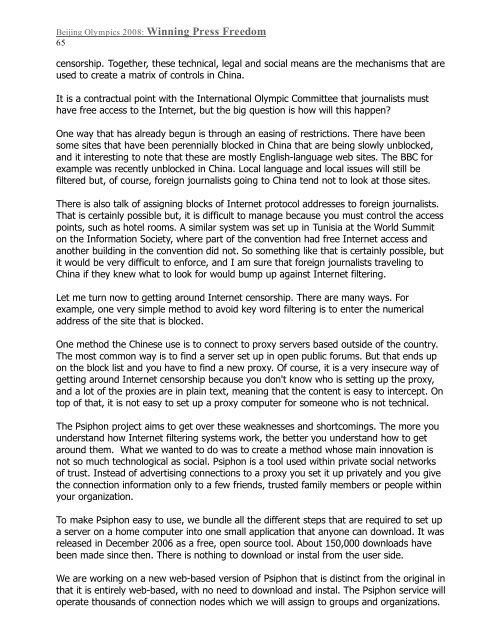Beijing Olympics 2008: Winning Press Freedom - World Press ...
Beijing Olympics 2008: Winning Press Freedom - World Press ...
Beijing Olympics 2008: Winning Press Freedom - World Press ...
You also want an ePaper? Increase the reach of your titles
YUMPU automatically turns print PDFs into web optimized ePapers that Google loves.
<strong>Beijing</strong> <strong>Olympics</strong> <strong>2008</strong>: <strong>Winning</strong> <strong>Press</strong> <strong>Freedom</strong><br />
65<br />
censorship. Together, these technical, legal and social means are the mechanisms that are<br />
used to create a matrix of controls in China.<br />
It is a contractual point with the International Olympic Committee that journalists must<br />
have free access to the Internet, but the big question is how will this happen?<br />
One way that has already begun is through an easing of restrictions. There have been<br />
some sites that have been perennially blocked in China that are being slowly unblocked,<br />
and it interesting to note that these are mostly English-language web sites. The BBC for<br />
example was recently unblocked in China. Local language and local issues will still be<br />
filtered but, of course, foreign journalists going to China tend not to look at those sites.<br />
There is also talk of assigning blocks of Internet protocol addresses to foreign journalists.<br />
That is certainly possible but, it is difficult to manage because you must control the access<br />
points, such as hotel rooms. A similar system was set up in Tunisia at the <strong>World</strong> Summit<br />
on the Information Society, where part of the convention had free Internet access and<br />
another building in the convention did not. So something like that is certainly possible, but<br />
it would be very difficult to enforce, and I am sure that foreign journalists traveling to<br />
China if they knew what to look for would bump up against Internet filtering.<br />
Let me turn now to getting around Internet censorship. There are many ways. For<br />
example, one very simple method to avoid key word filtering is to enter the numerical<br />
address of the site that is blocked.<br />
One method the Chinese use is to connect to proxy servers based outside of the country.<br />
The most common way is to find a server set up in open public forums. But that ends up<br />
on the block list and you have to find a new proxy. Of course, it is a very insecure way of<br />
getting around Internet censorship because you don't know who is setting up the proxy,<br />
and a lot of the proxies are in plain text, meaning that the content is easy to intercept. On<br />
top of that, it is not easy to set up a proxy computer for someone who is not technical.<br />
The Psiphon project aims to get over these weaknesses and shortcomings. The more you<br />
understand how Internet filtering systems work, the better you understand how to get<br />
around them. What we wanted to do was to create a method whose main innovation is<br />
not so much technological as social. Psiphon is a tool used within private social networks<br />
of trust. Instead of advertising connections to a proxy you set it up privately and you give<br />
the connection information only to a few friends, trusted family members or people within<br />
your organization.<br />
To make Psiphon easy to use, we bundle all the different steps that are required to set up<br />
a server on a home computer into one small application that anyone can download. It was<br />
released in December 2006 as a free, open source tool. About 150,000 downloads have<br />
been made since then. There is nothing to download or instal from the user side.<br />
We are working on a new web-based version of Psiphon that is distinct from the original in<br />
that it is entirely web-based, with no need to download and instal. The Psiphon service will<br />
operate thousands of connection nodes which we will assign to groups and organizations.





